Keep It Quiet Blu-ray Movie
HomeKeep It Quiet Blu-ray Movie 
Pas de scandaleCohen Media Group | 1999 | 105 min | Not rated | No Release Date
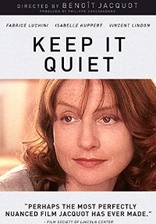
Price
Movie rating
6.9 | / 10 |
Blu-ray rating
| Users | 0.0 | |
| Reviewer | 3.5 | |
| Overall | 3.5 |
Overview
Keep It Quiet (1999)
After his release from jail, a former industrialist reunites with his family but doesn't quite seem the same man.
Starring: Fabrice Luchini, Isabelle Huppert, Vincent Lindon, Vahina Giocante, Thérèse LiotardDirector: Benoît Jacquot
| Foreign | Uncertain |
| Drama | Uncertain |
Specifications
Video
Video codec: MPEG-4 AVC
Video resolution: 1080p
Aspect ratio: 2.35:1
Original aspect ratio: 2.39:1
Audio
French: LPCM 2.0
Subtitles
English
Discs
50GB Blu-ray Disc
Single disc (1 BD)
Playback
Region A (B, C untested)
Review
Rating summary
| Movie | 3.5 | |
| Video | 4.5 | |
| Audio | 4.0 | |
| Extras | 2.5 | |
| Overall | 3.5 |
Keep It Quiet Blu-ray Movie Review
Reviewed by Jeffrey Kauffman October 28, 2015Note: This film is available as part of
The Benoit Jacquot Collection.
La Nouvelle Vague, the French New Wave, is a perhaps singular movement in the history of film, even if many of its supposed
proponents would argue about whether there was an “official” movement at all. It’s hard to think of another example of a group of
filmmakers crafting a series of films that revolutionized both content and (probably especially) form so viscerally as did iconoclasts like
François Truffaut and Jean-Luc Godard (and what’s really frightening is that these two titans, along with others in the New Wave
whatever it was, were critics to begin with—yikes!) Maybe the Abstract Expressionists, or even the Americans who would
later be identified (ironically by the French) as film noir adherents, could be afforded this same radical status, but the New Wave was
so revolutionary and trendsetting that it seems to stand alone, a monolithic presence not just in its native country, but in the entire
annals of cinema. That said, the fact that the New Wave looms so large in France’s history may have led to certain categorization issues for
some French filmmakers who followed in the wake of the Wave, including Benoît Jacquot, a man whose birthyear of 1947 was only one year
before The Birth of a New Avant-Garde: The Camera-Stylo, one of the first critical analyses that gave birth to the New Wave, was
published. That ostensibly should place Jacquot at least partially in a post-New Wave generation, since many of the movement’s most iconic
films came out in either the late fifties or early sixties (e.g., Paris Belongs to Us, The 400 Blows, Breathless
, Shoot the Piano Player), while Jacquot himself didn’t
really get started helming feature films until the seventies. However, Jacquot’s early career included an extended apprenticeship under one
of the more lustrous (if sadly lesser known) names from the New Wave, Marguerite Duras, a director in her own right who is nonetheless
probably best remembered for having written Resnais’ classic Hiroshima mon amour. Perhaps due to that connection, as well as to some almost ineffable elements that waft
through Jacquot’s films at times, some folks have tried pigeonholing him as a New Wave phenomenon, but Jacquot, while anarchic in his own
deliberate way, is more of a formalist than some might typically associate with New Wave sensibilities, and he has in fact even mounted the
same kind of historical epic (Farewell, My Queen)
that was a particular thorn in the sides of some of the postulants populating the pages of Cahiers du Cinéma back in the day. (It
should be noted that Jacquot’s “take” on the historical epic is typically insouciant at times, perhaps indicative of the fact that he probably
read some of the barbs aimed at this genre by some of the 1950s French critics.) Jacquot has been curiously underserved on Blu-ray, with
only 3 Hearts appearing in addition to the aforementioned
Marie Antoinette drama domestically on disc, but Cohen Film Collection is ameliorating that issue with a new release that collects three of
Jacquot’s 1990s efforts together.
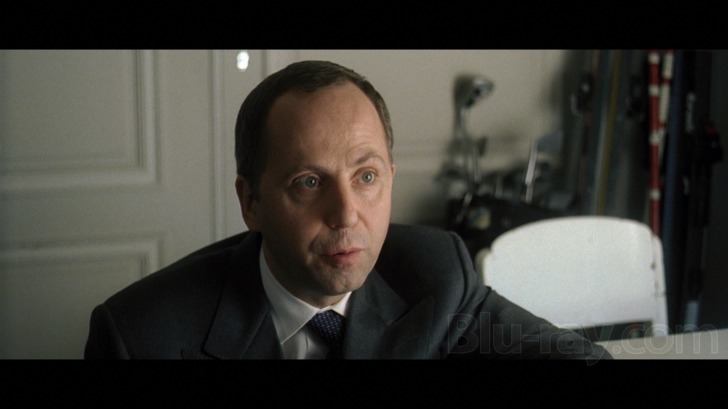
It may not exactly be The Brothers Karamazov, but according to Jacquot there is a Dostoyevskian element running through the tale of male siblings in Keep It Quiet (whose French title Pas de scandale translates better as No Scandal, in the imperative sense). Probably the most traditional narrative piece in the new Cohen collection, Keep It Quiet is still fairly discursive, as evidenced by the fact that one of the central issues that catapults one character through the story is never really fully explained.
That element has to do with the somewhat odd Grégoire Jeancourt (Fabrice Luchini, playing entirely against type as a laconic tight lip) and why exactly he spent four months in prison on some charge of financial impropriety having to do with his family’s business. It’s hinted that Grégoire “took the fall” in order to protect his family, though it’s never completely clarified what exactly happened. That leaves the viewer floundering at times to divine various relationships depicted within the film, none more so than that between Grégoire and his talk show host brother Louis (Vincent Lindon). The commentary describes Louis as someone like Charlie Rose, though more curmudgeonly types might prefer someone like Maury Povich or even Jerry Springer as the more appropriate referent, since Louis likes media sensations, at least if they involve him.
While the kind of weird dialectic between Grégoire and Louis informs much of the film, especially as Louis attempts to manage Grégoire’s media blitz after his release from prison, other relationships also enter the fray, including Grégoire’s equally odd interchanges with his wife Agnès (Isabelle Huppert). In a somewhat meandering way, Jacquot also introduces a number of supporting characters, including hairdresser Stéphanie (Vahina Giocante), who ends up befriending Agnès after doing her hair one day, but whose curt ex-con boyfriend William (Ludovic Bergery) has a connection to Grégoire due to their time in stir.
Keep It Quiet largely lives up to its Americanized title, and indeed is almost a cinematic equivalent to the minimalist compositions of someone like Philip Glass, where repeated motives never seem to be morphing and yet suddenly the listener (and/or viewer in this case) finds himself in a completely new territory almost as if by magic. The emotional tenor here is tamped down quite a bit of the time, despite a couple of revelations along the way, and Lucchini’s wide eyed take on Grégoire is weirdly reminiscent at times of Peter Sellers’ performance as the inimitable Chance in Being There.
Keep It Quiet Blu-ray Movie, Video Quality 
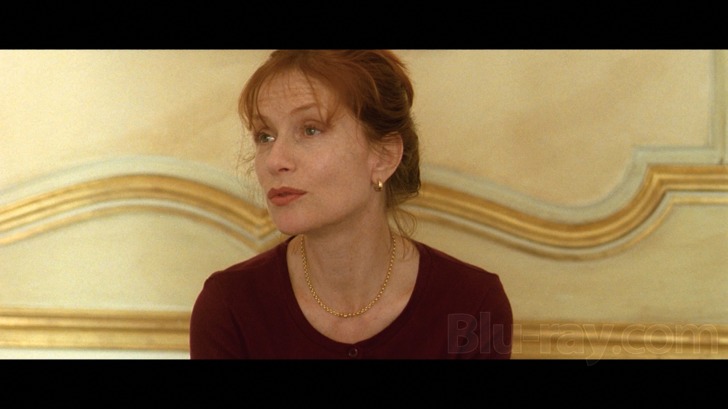
Keep It Quiet is presented on Blu-ray courtesy of Cohen Film Collection with an AVC encoded 1080p transfer in 2.35:1. All three films
in the The Benoit Jacquot Collection have
been sourced from new 2K restorations, and all three offer elements that are virtually damage free in terms of nicks, scratches or other similar
issues.
Keep It Quiet is comprised almost entirely of interior sequences, often lit in what looks to be natural sources, but commendably detail and
shadow detail are often at excellent levels. The palette is somewhat subdued (as is the case in all three films in this set), and there's a slightly
yellowish cast to the rather luxe apartment that Grégoire and his family live in. Close-ups offer excellent fine detail, and the grain field is natural
looking, offering no resolution problems whatsoever throughout the presentation. Some sequences, notably some of the scenes set in the
television studio where Louis works, are rather dark, and shadow detail is minimal in a few instances.
Three more screenshots in positions 7-9 are available in The Benoit Jacquot Collection Blu-ray review.
Keep It Quiet Blu-ray Movie, Audio Quality 
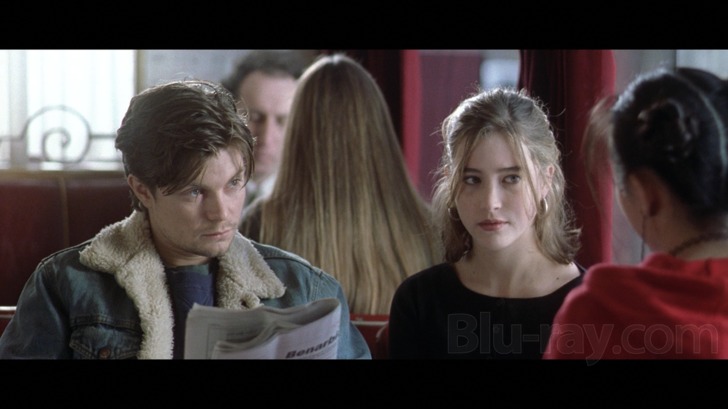
Keep It Quiet features an LPCM 2.0 track in the original French. The film perhaps lives up to its title with a somewhat unambitious sound design, but one of the more interesting elements is in its use of perhaps anachronistic piano music by Benjamin Britten (I mentioned Jacquot's sometimes provocative and unexpected use of music in my 3 Hearts Blu-ray review, something that's echoed here). There are occasional exterior shots where ambient environmental sounds are distinct and lifelike sounding, but the bulk of this film is quieter dialogue scenes, and the LPCM track supports those sequences effortlessly.
Keep It Quiet Blu-ray Movie, Special Features and Extras 
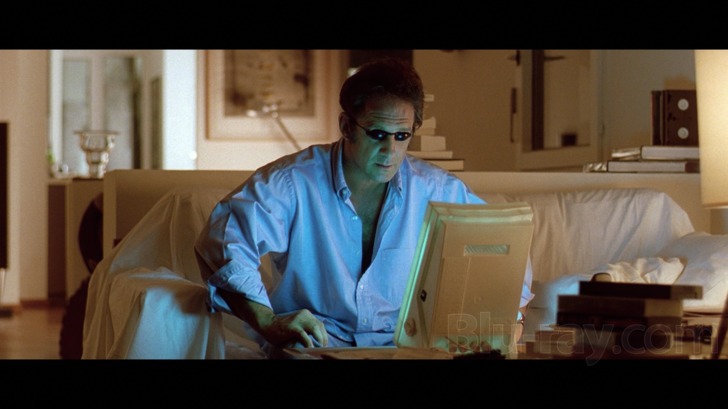
- Feature Length Audio Commentary by Film Critics Wade Major and Tim Cogshell is another interesting conversation between the two KPCC critics, where they talk about things like how this film exploits the dissolution of a family in the same way that The Magnificent Ambersons did.
- New Video Interview with Director Benoit Jacquot (1080p; 15:38) is hosted by the New York Film Festival's Kent Jones, who lapses in and out of French (with subtitles). This is in some ways the most eye opening of the three interviews included in the Jacquot set, with the director being surprisingly forthcoming about some of the foibles of the three main actors in the film.
- Original Theatrical Trailer (1080p; 1:28)
- 2015 Re-release Trailer (1080p; 1:28)
Keep It Quiet Blu-ray Movie, Overall Score and Recommendation 
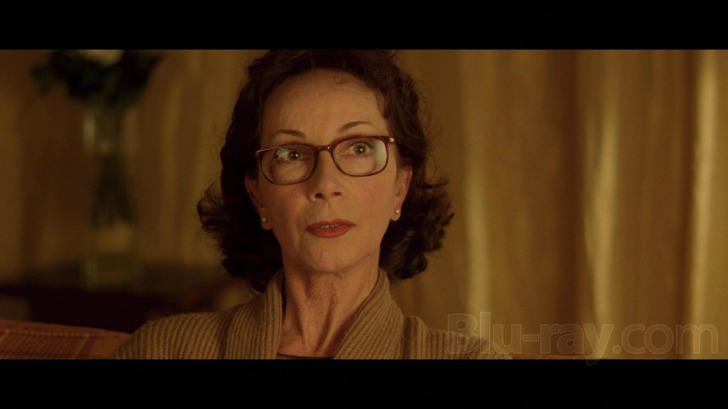
Paris may be the City of Lights and Philadelphia the City of Brotherly Love, but Keep It Quiet provides a fascinating if somewhat discursive look at two male French siblings who are attempting to forge their relationship in the wake of new developments and at least a couple of revelations. The film is intentionally tamped down on an emotional level, something that may create distance for some viewers, but performances are compelling, and it's fun to see Luchini playing such an unusual role. Technical merits are generally strong, and Keep It Quiet comes Recommended.
Similar titles
Similar titles you might also like
(Still not reliable for this title)

L' argent
1983

Les Miserables
I miserabili
1934

Bastards
Les Salauds / Slipcover in Original Pressing
2013

Les Amants de Montparnasse
1958

The Soft Skin
La peau douce
1964

Pickpocket
1959

36th Precinct
36 quai des Orfèvres
2004

Summer Hours
L'heure d'été
2008

Little White Lies
Les petits mouchoirs
2010

Home
2008

Neon Bull
Boi Neon
2015

Things to Come
L'avenir
2016

Tchao pantin
So Long, Stooge | Limited Edition
1983

The Valley (Obscured by Clouds)
La Vallée
1972

Kiss of the Spider Woman
Collector's Edition
1985

A Fantastic Woman
Una mujer fantástica
2017

The Fool
Дурак / Durak
2014

The Eel
うなぎ / Unagi | Limited Edition
1997

Shoeshine 4K
Sciuscià
1946

The Apartment
L'appartement
1996